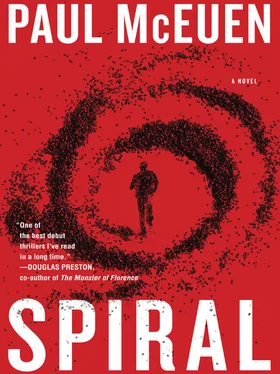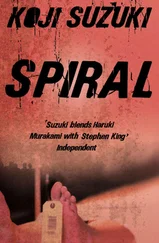MOMENTS LATER, THEY WERE BACK OUTSIDE. VLAD WAS WAITING by the car, gun in hand. “Anything?” Jake asked.
“A pheasant attacked, but I fought him off.”
Maggie handed Jake the tube with the DNA. “You two go. You don’t need me. I’m staying here.”
“What? Why?”
“I want to check the USDA APHIS alerts, to see if anything matches the description of the Uzumaki. If they’re worried about a pathogen, they’ll put out a notice. I also have all of Liam’s field notebooks in the back of the herbarium, the notes he took on his trips. I want to check the ones that cover his trips to South America. Especially Brazil.”
“I’m not leaving you here alone,” Jake said.
“The woman who hurt Liam is long gone. New York City, Bellevue.”
“I don’t care. You’re not—”
“Stay with me if you want. Help me look. Vlad can take the DNA.”
Vlad shook his head. “ Nyet . I don’t drive.”
Jake said, “He can barely take riding in a car. Won’t go near a plane. Come with us.”
“Jake, this place is like a fortress. There are only two doors, and they’re both steel-reinforced.”
Jake didn’t like it, but he could see Liam in her eyes, that unwavering determination. If Jake wasn’t willing to throw her bodily into the car and sit on her the whole ride, he was going to lose this one.
“Give her your gun,” Jake said.
Vlad handed his pistol to Maggie.
“Are you kidding? I’ve never fired a gun in my life.”
“Don’t worry,” Vlad said. “It is like camera. Just point and shoot.”
 21
21 
THE HELICOPTER CARRYING THE POTENTIALLY CATASTROPHIC payload flew at three thousand feet over the outskirts of Frederick, Maryland. Through the Huey’s window, Dunne watched the rows of houses and crisscrossing streets jammed with morning traffic pass underneath them. He checked his watch: eight a.m.—rush hour. Dunne couldn’t help think about the madness of Fort Detrick’s location. Ground zero for biowarfare—the place that kept the most dangerous agents ever devised by man or nature—should be off the map, housed somewhere in the desert or the badlands of South Dakota. Instead it was in the middle of the second-largest city in Maryland, a mere fifty miles from Washington, D.C. If the Uzumaki got out, Detrick would be the command center for the fight to stop it.
The Huey banked as they crossed the north entrance guard shack. Dunne watched the Eight Ball, the four-story steel globe used during the fifties and sixties to test the efficacy of bioweapon dispersion and aerosolization, pass beneath them. Since the forties, Detrick had been the focal point for U.S. chemical and biological weapons efforts, but had fallen on hard times after biological weapons were banned in 1972. Now she was in the middle of a new growth spurt, due in no small part to his efforts. The one-two punch of September 11 and the anthrax attacks had put bioterrorism back at the center of the national security agenda. Buildings were going up as fast as they could be slapped together on the twelve-hundred-acre site, creating the largest concentration of class-3 and class-4 biohazard facilities in the United States. This included Toloff’s dedicated and highly secret facility for Uzumaki research and countermeasure development.
Toloff was up front, making arrangements with the ground crews for their arrival. The copilot unstrapped himself and came back to Dunne’s seat. He knelt next to Dunne, yelling to be heard over the noise of the rotors. “Sir, I’ve been told to deliver you a message from the national security adviser’s office. I quote: ‘Get your ass to the White House.’ ”
Dunne couldn’t help smiling. His superior, National Security Adviser Marvin Alex, was an old Washington hand who’d done stints at State and Defense for both Republican and Democratic administrations. His salty language was SOP.
“Should I send a response, sir?”
“Tell him I’ll be there to help him hold hands inside of two hours.”
Dunne had already triggered the U protocol, a series of escalating steps to be followed in case of a potential Uzumaki outbreak. They were at level 2 until the Uzumaki infection in the Japanese kid could be verified. At level 2, the CDC, USAMRIID, and all the various alphabet soup of federal agencies quietly started procedures to ready themselves for full-blown response, like a giant beast awakening for the final battle at Armageddon.
Dunne pulled out his laptop and brought up the two photos of the young Chinese woman: one taken by the security camera on the bridge at Cornell, the other by a passerby in Times Square.
Who the hell are you?
Two years ago, Dunne had led a small team of bioweapons experts and epidemiologists through a series of worst-case scenarios for the Uzumaki: a terrorist group gets ahold of one of the missing cylinders, or the Chinese dig it up at Harbin and decide to use it in a preemptive attack. Without an effective treatment or a vaccine—both of which were months, if not years, away—the number of dead from even a single-point-of-dispersal event could be in the millions. A lone actor could single-handedly trigger a disaster of cataclysmic proportions.
DUNNE WAS OUT OF HIS SEAT THE MOMENT THE HELICOPTER sat down on the helipad next to the main USAMRIID building. Toloff was already on the tarmac, barking orders at the ground crew. Dunne watched as the Hazmat container was wheeled away, then followed Toloff as they jogged along Ditto Avenue through the heart of Detrick.
Toloff pointed to the red-brick building up ahead. “In under an hour we’ll know exactly how much shit we’re in. We’ll crack open the vault in a class-3 area, move the sealed biosafety containers into class-4. I’ll run everything from there.”
Dunne grabbed her arm. “I’m going to be talking to the President in a few minutes. He’s going to want an answer, good or bad.”
She didn’t have to reply. Her anguished face said it all.
 22
22 
JAKE AND VLAD DROVE PAST ONE DILAPIDATED HOUSE AFTER another, their yards filled with cast-off farm equipment, auto parts, and washer-dryers. Buffalo Road was only ten miles from downtown Ithaca but a world away. Central New York was mostly rural poor, dotted by old industrial towns. Ithaca was an anomaly, an educational mecca with twenty thousand or so overeducated academics and artists plunked down at the northern edge of Appalachia.
Vlad leaned forward. “Slow down,” he said. “I want to live to be an old man.”
“We’re fine,” Jake said. He glanced at the speedometer—seventy-five. Fine, unless they crested a hill and found a tractor coming the other way.
“Please,” Vlad said. “I am convinced I will make a very good old man.”
Jake kept the gas on as they passed an abandoned farmhouse, the roof swaybacked and peppered with holes, the windows covered in rotting particleboard. A stack of rusted wheel rims in the yard had fallen over, spreading across the yard like poker chips on a blackjack table. An old grain silo stood in the field behind it, the front gone, save the metal staves like the rib cage of a long-dead animal.
“Why would anyone live out here when they don’t have to?” Jake asked.
“He likes a place to shoot his guns.” Vlad also had a thing for guns. The Cornell police arrested him once after they’d received calls of a strange man firing a pistol into Cascadilla Gorge. “What the hell are you doing?” the arresting officer had asked.
Читать дальше

 21
21 










